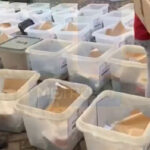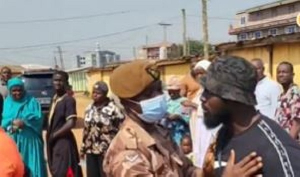The Asawase constituency in the Ashanti Region has recently been rocked by controversy, particularly in the Akurem area, as supporters of the National Democratic Congress (NDC) staged a protest against the decision of Manaf Ibrahim, the New Patriotic Party (NPP) parliamentary candidate, to join a queue during voting. This incident has added another layer of tension to the already volatile political environment as Ghana gears up for the 2024 elections.
The Incident at Akurem
What was initially expected to be a routine day of voting at a local polling station in Akurem, Asawase, quickly escalated into a heated protest as NDC supporters raised concerns over the actions of Manaf Ibrahim. The parliamentary candidate for the NPP was seen joining the queue with regular voters, an act that sparked anger and confusion among his political rivals.
NDC supporters, some of whom were already present at the polling station, immediately began to voice their disapproval. They argued that the candidate should not have been allowed to join the queue like any other voter, given his position as a parliamentary contender. The protesters insisted that his actions were politically motivated, aimed at gaining favor or influencing the voting process. Tensions rose as the NDC supporters demanded that Ibrahim be removed from the queue and be treated differently due to his status as a candidate.
Political Tensions Escalate in Asawase
Asawase has long been a hotbed of political rivalry, especially between the NDC and NPP. The constituency is known for its passionate supporters on both sides, and incidents like this only serve to amplify the already tense atmosphere leading up to the 2024 elections. The NDC, which has historically enjoyed strong support in the region, was quick to mobilize its supporters to protest what they saw as an unfair advantage for Ibrahim.
The protest at Akurem is a reflection of the wider political climate in the region. In Ghana, accusations of unfair campaign tactics and election malpractice often dominate political discourse, and any perceived slight is met with swift opposition. For the NDC, the protest was not just about the act of queuing but about maintaining what they see as the integrity of the electoral process and the principles of fair competition.
The Role of Manaf Ibrahim
Manaf Ibrahim’s decision to join the queue was met with mixed reactions. On the one hand, some argued that his actions were simply a demonstration of his commitment to the democratic process, showing that he, too, was a voter who followed the same procedures as any other citizen. However, for many of his critics, his actions raised questions about the optics of the situation and the potential for manipulating voter sentiment.
As a parliamentary candidate, Ibrahim’s presence at the polling station was already a point of interest for many voters, and his decision to join the queue only heightened the scrutiny. For the NDC supporters, this was seen as an attempt to gain attention, perhaps even to appear as if he were more connected to the people, while simultaneously undermining the legitimacy of the voting process.
A History of Political Rivalry in Asawase
The tension in Asawase is not an isolated incident. The region has been a focal point of political rivalry between the NDC and NPP for years, with both parties vying for influence in the predominantly Muslim constituency. Over the years, there have been numerous reports of political unrest, including allegations of vote-buying, intimidation, and violent clashes between supporters of the two parties.
Asawase has also witnessed some of the most contentious parliamentary elections, with the NDC consistently holding a strong grip on the constituency. However, with the rise of new candidates like Manaf Ibrahim, the NPP is seeking to make inroads into a traditionally NDC stronghold. This growing political contest has only heightened the stakes and contributed to the current tensions.
The Bigger Picture: Electoral Integrity
The protest in Asawase also speaks to a larger issue: the integrity of the electoral process in Ghana. As the 2024 elections approach, political parties are becoming more desperate in their efforts to secure votes, sometimes resorting to questionable tactics to influence the outcome. In this case, the protest over Manaf Ibrahim’s actions at the polling station raises concerns about the transparency and fairness of the upcoming elections.
While the protest itself may have been sparked by a single incident, it underscores the larger question of how political candidates and their supporters interact with the electoral system. As Ghana continues to develop as a democracy, it is crucial that the country maintains its commitment to fair and free elections. This includes ensuring that all candidates are treated equally and that no undue advantage is given to any individual or political party.
Conclusion
The controversy surrounding Manaf Ibrahim’s decision to join the queue at a polling station in Akurem is just one of many incidents that could shape the outcome of the 2024 elections in Ghana. Asawase, with its longstanding political rivalry, has once again become a battleground for party supporters, with both the NDC and NPP fighting for dominance in the constituency.
As tensions continue to rise in the lead-up to the elections, it is clear that Ghana’s political climate is becoming more polarized. The protest in Asawase highlights the challenges facing the electoral system, where every action—no matter how small—is scrutinized and often interpreted as part of a larger political strategy.
The need for fair elections, transparency, and respect for democratic processes has never been more urgent. As the nation prepares for what promises to be a contentious election, it is vital that all political parties and their supporters remain committed to upholding the principles of democracy, ensuring that the voice of the people is heard above the noise of political rivalry.




